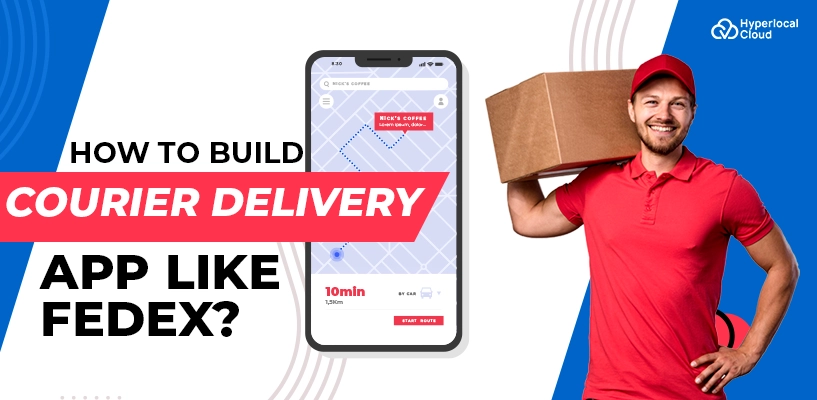How To Build A Fedex Shipping App

On-demand delivery applications provide a time-saving solution that users highly value. Courier delivery apps have become popular for individuals who cannot procure necessities due to their busy schedules. Courier delivery applications have made it possible to send or receive packages without leaving homes. Therefore, a huge market potential exists for an on-demand courier delivery app. In the past, customers encountered challenges in transporting their packages from one location to another owing to inadequate technological advancements.
As per the Allied Marketing Research report, the worldwide logistics market is projected to grow from $12 billion in 2021 to $80.6 billion in 2031, exhibiting a compound annual growth rate (CAGR) of 20.8%.
Are you looking for a way to build your own courier delivery app but lacking the guidance to do so? Hyperlocal Cloud is ready to provide you with a top-notch courier delivery app like FedEx.
What Is FedEx?
FedEx is a global courier delivery services company that provides transportation, e-commerce, and supply chain management solutions to businesses and individuals worldwide.
The operational mechanism of a courier service application such as FedEx involves using advanced technology to facilitate the delivery of packages and parcels. The application is designed to allow users to create a shipment request, track the status of their package, and receive real-time updates on the delivery process.
Although FedEx and other leading companies dominate the market, industry analysts express confidence that new players will emerge to fill certain gaps. This article analyzes the operational mechanics of FedEx’s on-demand delivery service. Additionally, it presents guidance for aspiring entrepreneurs who intend to establish a logistics enterprise akin to FedEx.
What Are The Different Types Of Courier Delivery Apps?
Familiarity with the different courier delivery app models is essential for successful on demand app development.
The courier delivery app operates in three modes:
Business to Business (B2B)
“B2B” denotes exchanging information and communication between two or more business entities. The main objective is to restock merchandise from a wholesaler to a retailer.
B2B delivery companies offer a scheduling service that enables retail stores to replenish their inventory at their preferred time.
Business to Customer (B2C)
B2C exchanges are mutually advantageous for the business and the consumer. Business-to-consumer (B2C) refers to the commercial activity of a company providing a product to a single consumer who has placed an order through either an online or offline channel.
Customer to Customer (C2C)
C2C technology facilitates communication between single and multiple customers in various locations. The C2C courier service provides customers with security while transporting their packages.
The C2C courier app allows customers to schedule a delivery directly. The C2C courier service collects, transports, and delivers the package the sender has booked to the intended recipient.
Upscale Your Business Through A Courier Delivery App Development Like Fedex
Benefits Of Courier Delivery App Development
- Utilizing a courier delivery tracking application offers numerous benefits, irrespective of the app’s business model.
- Implementing courier tracking systems provides customers with a streamlined and user-friendly method for monitoring the delivery status of their packages.
- Improving the customer experience has been shown to impact brand loyalty positively. Customer loyalty can lead to increased revenue and business growth.
- The utilization of parcel delivery applications gives employers more flexibility in managing their workforce’s schedules and reduces operational expenses.
- Checking packages in and out and obtaining a signature from the recipient can be streamlined without using bulky equipment.
- One can opt for the package delivery services strategy, similar to Uber, to avoid the expenses and inconvenience of hiring a personal team of couriers.
- Acquiring and retaining freelance workers for package delivery services is more efficient and expeditious than recruiting and instructing new personnel.
Business Models for a Courier Delivery App like FedEx
Postal and Courier Application
FedEx is a prominent postal courier application considered an exemplary model. Their business operations are entirely dependent on mobile applications. Real-time tracking and management capabilities are available for same-day deliveries. The utilization of a different administrative dashboard enhances the various advantages.
Package Tracking Aggregators
Centralization of information tracking across all available carriers is necessary. Push notifications are crucial in providing users with real-time updates regarding the whereabouts of their packages. This feature is highly beneficial in ensuring users remain informed throughout the delivery process. Furthermore, packages are included manually, relying on their designated identification number.
Branded Delivery and Integrated Services
This strategy relies on the order tracking functionalities integrated into mobile applications by companies. Moreover, certain online retail platforms may provide a comprehensive account of each stage involved in the delivery procedure.
This application offers a significant advantage by providing the user with real-time updates regarding their package status, including shipment confirmation, transit updates, and delivery confirmation.
Branded package delivery apps are a successful strategy for many retailers, as they enhance customer accessibility and convenience.
Uber-Like Apps for Parcel Delivery
The ride-hailing company, Uber, has not only brought a significant change in the traditional taxi industry but has also established a successful business model that other industries can emulate. The success of Uber has inspired other courier delivery services, such as Uber for courier delivery, to emerge in the industry.
A courier delivery service that emulates the Uber model has the potential to achieve significant success, considering the company’s track record of disrupting traditional practices in various sectors.
After acquiring knowledge about different business models, we will focus on developing a courier service through coding.
How Does A Courier Delivery App Like FedEx Work?
The courier delivery application offered by FedEx assists customers in optimizing their shipping procedures. The application’s users possess the capability to perform the subsequent actions:
Create shipments: The FedEx app allows customers to utilize courier services by generating shipments that include delivery and pickup details, shipping preferences, and package descriptions.
Track shipments: Real-time shipment tracking provides customers with delivery status updates, such as delivery progress and estimated delivery time.
Make payments: The payment options available to customers include credit or debit card payments, online wallets, and more, which can be made directly through the FedEx mobile application.
Manage deliveries: Manage your deliveries by rescheduling a pickup, modifying your delivery address, or requesting a new delivery time.
View shipping history: A customer can access their shipment history to view tracking numbers, shipping labels, and receipts for packages that have been sent previously.
Receive support: FedEx provides its users with access to support services. This enables them to inquire about their shipping options and costs, file complaints, and seek answers to their queries.
The FedEx courier delivery application streamlines the delivery process and enhances the customer experience by offering a user-friendly and convenient platform for managing shipping requirements.
Double Your ROIs With A Courier Delivery App Like Fedex
Features of On-Demand Courier Delivery Apps Like FedEx
The FedEx application optimizes the delivery procedure and simplifies the process for clients to manage their shipping requirements. Several characteristics that exhibit such traits include:
Shipment creation: To create a shipment, customers must choose a shipping method, specify a delivery address, select a pickup location, and provide the necessary package details.
Real-time tracking: Real-time tracking enables customers to track shipments and receive notifications regarding any updates to the delivery status, including the delivery driver’s location or changes to the delivery window.
Payment integration: The application offers customers multiple payment options, including popular credit and debit cards, enabling them to pay for their orders.
Delivery management: The delivery process empowers customers to control their orders by allowing them to make adjustments such as rescheduling, rerouting, and redelivering.
Shipping history: You can access a customer’s shipping history to retrieve information about previous shipments, including tracking numbers, labels, and receipts.
FedEx support: The FedEx app provides a platform for users to access FedEx customer service. Users can submit support tickets through this platform, obtain information about shipping options and costs, and access relevant services.
Package pickup: The app allows customers to schedule a package pickup.
Delivery options: Customers can access various delivery options, including express delivery, ground shipping, and freight shipping.
Mobile printing: The app’s mobile printing feature enables customers to print shipping labels and other documents directly from their mobile devices.
Easy navigation: The application features an easy-to-use interface and a simple layout, allowing users to access the desired content and data quickly and efficiently.
Points You Need To Consider Before Developing a Courier Delivery App Like FedEx
Incorporating a courier service into business operations is considered a beneficial practice. Here are some considerations you need to make before proceeding.
Market Your App
Achieving success for a mobile application necessitates more than simply engaging a leading mobile app development firm and launching it. Assurance of an app’s return on investment is only possible by implementing powerful promotional strategies. Marketing and promotion of an app should be carried out on social media platforms such as Twitter and Facebook.
Local Requirements
To effectively build customer loyalty, it is essential to identify and target your ideal clientele. Once identified, dedicated efforts should be made to earn their trust and commitment. Positive feedback from satisfied customers is a crucial factor in the growth of any business.
Offers Are Beneficial
Providing discounts or free items is an effective strategy to advertise an application and encourage individuals to download and utilize it. It is essential to clearly understand the types of offers that will attract your intended audience. Experimenting with different permutations can provide valuable insights into the potential offerings for customers.
Feedback Matters
It is advisable always to consider criticism seriously and not disregard it. These comments are recommended for fostering long-term relationships with customers. Prompt responsiveness to customer feedback is crucial. This statement represents a significant key point for the field of customer service.
Custom Messages Are Important
Personalized messages are required to provide users with a customized experience. Immediate discounts can be sent to customers, but limiting the frequency of messages is recommended to prevent annoying.
Having understood the reasons behind the high demand for courier delivery applications, you can now initiate the planning process for their development.
How To Build A Courier Delivery App For a Courier Business?
Given below are the needed steps for building a courier delivery app for businesses:
Verify Your App Concept
The initial stage in app development involves the creation of a flowchart, which aids developers in comprehending the process and visualizing it more effectively. It is necessary to validate the idea to determine whether the intended market truly requires a solution to a problem.
To authenticate the novelty of your application concepts, kindly respond to the subsequent inquiry:
- What are the reasons for utilizing a courier application?
- What are the future possibilities?
- What is the level of market acceptance at present?
- What is the level of popularity or customer satisfaction with the services provided?
- What is the problem that your application aims to address?
Choose The Business Model
When selecting a business model, it is important to consider location, competition, market, existing local delivery ecosystems, and customer expectations. Consider factors such as the requirements of the enterprise, the accessibility of resources, and the possibility of expansion.
Hire An Experienced Team
Developing an on-demand delivery application can be a challenging task. A comprehensive team comprising designers, developers, quality assurance specialists, marketers, and product managers is imperative. It is recommended that you engage the services of a reliable app development company to undertake the development of your application. The services provided by the agency will aid in the development, launch, and promotion of the app.
Determine the Scope of Features
Once the theoretical aspects of the idea have been completed, the next step is to proceed with the practical implementation. A recommended starting point is to create a comprehensive inventory of the essential functionalities that your application must possess.
Develop a Minimum Viable Product
The term “Minimum Viable Product” (MVP) denotes the version of an application that comprises only the fundamental features necessary for its basic functionality. The Minimum Viable Product (MVP) has no distinct or exclusive functionalities. The item meets the requirements for its intended use. After finalizing the crucial features for your courier delivery application, you can proceed with the development of a minimum viable product. The App Store and Google Play are suitable platforms for launching the Minimum Viable Product (MVP) and acquiring initial adopters.
Learn and Improve
After the Minimum Viable Product (MVP) is published on Google Play or Apple Store, user feedback can be gathered and utilized for learning purposes. Reporting and analytics can provide valuable data to support informed business decisions.
Testing
Upon completing the development phase for your courier delivery software, proceeding to the testing phase is necessary. During this phase, it is necessary to conduct comprehensive testing of all application components to ensure their proper functionality.
Maintenance
The post-release performance of your app is crucial for its sustained success. An application generally comprises front-end and back-end programming, user interfaces, and a substantial amount of database identification.
A dedicated maintenance team is necessary to address the high probability of encountering bugs and to ensure regular updates are made to the app to improve its performance.
Get Smart And Reliable Courier Delivery App Development Solutions
How Much Does It Cost To Develop A Courier Delivery App Like FedEx?
The courier delivery app development like FedEx can incur high costs due to various factors such as the intricacy of the application, the desired features to be incorporated, the development team’s geographical location, and the developers’ hourly rate.
Development costs for a basic courier delivery application range from $5,000 to $10,000. On the other hand, a complex application with advanced features and a distinctive user interface can cost up to $30,000.
The cost of developing an app similar to FedEx’s courier delivery service is subject to significant variability. It is contingent upon various factors, including the intricacy of your specifications and the proficiency of the development team you engage.
Conclusion
The delivery applications are crucial for the efficient functioning of courier and package delivery services. Developing a courier application requires significant time, specialized knowledge, and various resources.
Courier delivery software development, like FedEx, is expected to substantially decrease labour requirements, interpersonal communication, and logistical issues.
Many logistics companies are allocating resources toward creating customizable delivery applications for their clients. The preceding details and technological innovations should be utilized in the development of a courier application that will be well-received by users.





